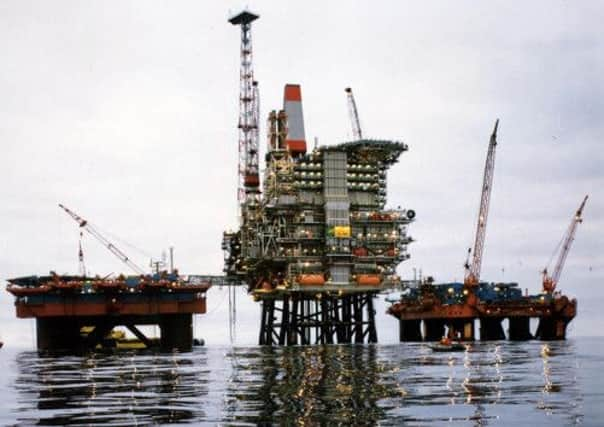Independence: Vote affecting oil investment plans


• The referendum on Scottish independence is a factor in 38% of offshore operators, up 6% in 12 months
• Oil and gas companies unable to take view due to lack of detail and clarity about future
Advertisement
Hide AdAdvertisement
Hide Ad• Industry still benefiting from period of rising confident, investment activity and employment
The number of offshore operators and contractors reporting that the outcome of the vote is now a factor in their future plans and investment proposals has risen from 32 to 38 per cent in just twelve months, according to the latest Oil and Gas Survey published by the Aberdeen and Grampian Chamber of Commerce.
Over the same period the number of companies reporting that the outcome of the referendum is having no impact on future investment plans has fallen from 65 per cent to 57 per cent.
The report, however, also stresses that Britain’s oil and gas industry is still benefiting from a period of rising confidence, investment activity and employment.
‘Agenda item’
Cliff Lockyer, the author of the report from the Fraser of Allander Institute at Strathclyde University, said the new statistics on the referendum debate showed that the outcome of the the vote in 2014 was becoming “more of an agenda item” within Britain’s most important industry.
And he explained: “In this survey we have tried to establish a few more reasons behind these views and we got range of different views expressed. About ten per cent thought the effects would be limited for a number of different reasons.
“Some said they worked well with the UK and Scottish Governments and they would expect these good relations to continue. Others said the sector is so important to the economy that Governments have to listen to it so there won’t be many changes.”
Lack of detail
Mr Lockyer continued: “A second group prefaced their concerns by not saying they necessarily thought it (independence) was a bad idea but expressed some concerns that it could lead to more complications if, for example, there was diversity in regulations and tax regimes.
Advertisement
Hide AdAdvertisement
Hide Ad“Some companies said it could become more complicated if they wanted to shift work around and people about.”
And he revealed: “But the majority of those responding said we can’t take a view at the moment because we don’t know - we have no guidance as what the regulatory, taxation and and fiscal regulations and other policies would be and, in that sense, uncertainty is the thing that prevails.”
Kenny Paton, a partner in national legal firm Bond Dickinson, the survey sponsor, said oil and gas operators had generally avoided becoming involved in the independence debate and he believed the high percentage expressing concern about the referendum did not not “reflect fear of an independent Scotland or remaining within the Union”.
‘Risk’
He said: “As several indicated in their responses it is because of a lack of clarity and detail about what might happen in the future.”
But he stressed: “The main issue isn’t about whether the oil and gas business is in favour of independence or not. It is about actually ‘we have nothing to base it on.’ Oil companies are used to dealing with risk and used to balancing risk and reward.
“And uncertainty and risk has to be minimised if we are to continue to attract the 30 year high investment levels that we have seen recently.”
He said that last week Professor John Paterson of Aberdeen University had warned resolving issues like maritime boundaries and existing oil and gas licences might not be a simple process.
Mr Paton added:“Companies are looking for a favourable and stable fiscal environment in which they can make long term investments. If a province meets this criteria and the companies can make a return on their investment then they will be happy.
Advertisement
Hide AdAdvertisement
Hide Ad“It is a business which operates on the basis of risk and reward and with the right balance companies won’t really care if it is a post-Gaddafi Libya or an independent Scotland.”
‘Political football’
Bob Collier, chief executive of Aberdeen and Grampian Chamber of Commerce, said he would expect the number of businesses identifying the planned referendum as a factor in future plans and investment proposals to increase should the “Yes” and “Better Together” campaigns continue to use oil and gas as a political football in the independence debate.
According to the report, 60 per cent of operators are anticipating a rise in activity this year while 40 per cent are forecasting a level trend in business activity. But, in line with previous surveys, the skills shortage is continuing to constrain activity. In addition, the number of contractors identifying local infrastructure issues as likely to limit UKCS activity has more than doubled over the last two years.
A spokesman for the Yes Scotland campaign said: ‘’Last year saw the largest ever response to a licensing round in the North Sea with more companies looking to drill in more blocks. And only last week Malcolm Webb, Chief Executive of Oil and Gas UK, confirmed that this year the North Sea has seen the highest levels of capital investment ever.’’